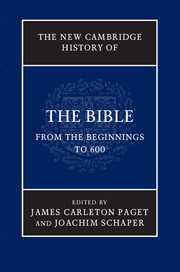Book contents
- The New Cambridge History of The Bible
- Series page
- The New Cambridge History of The Bible
- Copyright page
- Contents
- Figures
- List of contributors
- Preface
- Abbreviations
- Abbreviations of books of the Bible
- Table of Psalm numbering
- Part I Languages, writing systems and book production
- Part II The Hebrew Bible and Old Testaments
- Part III The New Testament
- 17 The New Testament canon
- 18 The New Testament text and versions
- 19 The ‘apocryphal’ New Testament
- 20 The Old Testament in the New Testament
- Part IV Biblical versions other than the Hebrew and the Greek
- Part V The Reception of the Bible in the Post-New Testament Period
- Select bibliography
- Index of manuscripts
- Index of scriptural and related sources
- General index
17 - The New Testament canon
from Part III - The New Testament
Published online by Cambridge University Press: 05 May 2013
- The New Cambridge History of The Bible
- Series page
- The New Cambridge History of The Bible
- Copyright page
- Contents
- Figures
- List of contributors
- Preface
- Abbreviations
- Abbreviations of books of the Bible
- Table of Psalm numbering
- Part I Languages, writing systems and book production
- Part II The Hebrew Bible and Old Testaments
- Part III The New Testament
- 17 The New Testament canon
- 18 The New Testament text and versions
- 19 The ‘apocryphal’ New Testament
- 20 The Old Testament in the New Testament
- Part IV Biblical versions other than the Hebrew and the Greek
- Part V The Reception of the Bible in the Post-New Testament Period
- Select bibliography
- Index of manuscripts
- Index of scriptural and related sources
- General index
Summary
- Type
- Chapter
- Information
- The New Cambridge History of the Bible , pp. 389 - 411Publisher: Cambridge University PressPrint publication year: 2013
- 1
- Cited by

